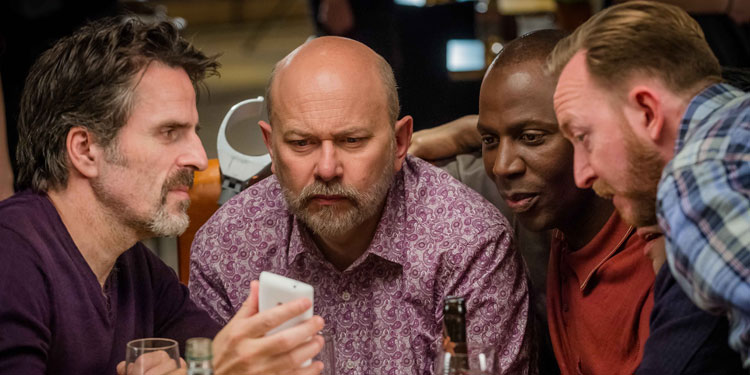
Director: Various
Running Time: 552 mins
Certificate: 18
Release Date: March 16th 2015 (UK)
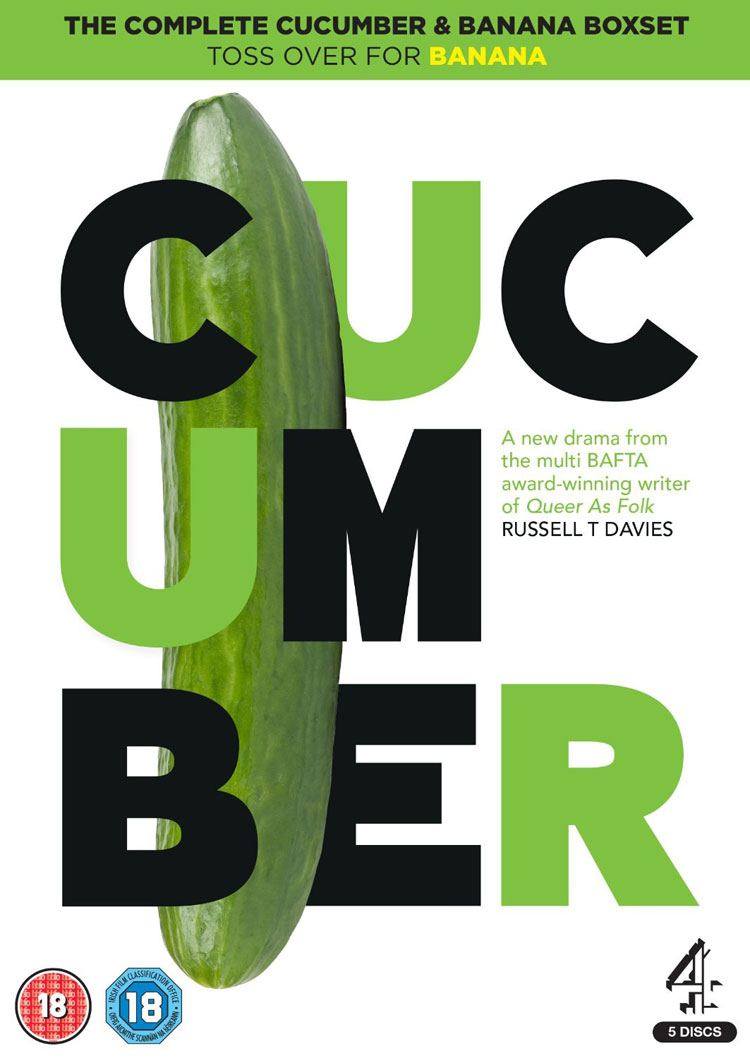
Cucumber arrived on British television with huge amounts of fanfare. After all it was a return to gay Manchester for writer Russell T Davies more than 15 years after Queer As Folk. Plus it came with the interesting idea of having a secondary show, Banana, which aired on E4 and told a half-hour story about one of the characters from the main Cucumber episode.
However after the first episode the critical response was somewhat muted, and while many viewers hung around hoping Cucumber would suddenly become great, a lot of people gave up partway through. However now that the whole thing is complete and has been released on DVD, should everyone have stuck around until the end?
Henry (Vincent Franklin) is a successful, 40-something gay man living in Manchester with his partner Lance (Cyril Nri). However in the space of a couple of days his entire life goes haywire when a simple inquiry about potential plagiarism results in a colleague’s suicide and he gets suspended from work without pay. Plus, on a date he barely considers Lance’s suggestion that they should get married, which ends up with a disastrous threesome and the couple breaking up.
Henry goes to live in what is essentially a squat with the much younger Freddie (Freddie Fox) and Dean (Fisayo Akinade), drawn to both its faux-bohemian nature and also because Henry lusts after Freddie, who he knows has a reputation for sleeping with an endless string of men and women, whether singly or in groups. Freddie tells Henry bluntly that they will never have sex, but he doesn’t give up hope. Or at least he hopes they’ll have everything sex can bring except actual fucking, as despite nine-years with Lance and many men before that, Henry has never actually had penetrative sex with a man.
Around that are various other stories, such as Henry’s nephew’s shirtless exploits with other teenage boys, which he has commodified and sold on the internet in homoerotic video blogs. There’s also Lance’s flirtation with a new man, Daniel (James Murray), who one moment is insisting he’s just about the straightest person on the planet but the next is giving Lance signals that even the most brazen gay man would think lacked subtlety.
There is a lot that’s really good in Cucumber but also a lot that’s problematic. Russell T Davies attempts to take on the gamut of modern sexuality, from teens for whom sexuality seems utterly amorphous to middle-aged men who know they’re no longer the belle of the ball, but who still lust after youth and beauty, perhaps not properly settling down due to a constant sense that the next guy might be better. He tackles his various subjects with gusto, offering the sort of blistering peel-back of life that few others can do so well.
However the big issue, and what turned off quite a lot of people when it was on TV, is that there are few characters you can really empathise with. Although Henry is complex and interesting, it’s constantly difficult to get past the feeling that underneath it all, he is a selfish asshole, only being partially redeemed during the final episode. And that’s true for most of the characters, with the result that it’s often difficult to care what happens with them.
And when there’s a rare character who is actually nice, most of the time it turns out they’re either morons, being dangerously exploited, or on the verge of becoming a stalker.
It’s a shame as much of the time what the characters are talking about is smart, extremely well told, funny and interesting, but the characters themselves are often just unpleasant. Part of the problem is that Davies expands on the trick he used with Stuart in Queer As Folk, who was a character who didn’t talk like people really do – hiding their real thoughts or ensuring their ideas reach the world in a more palatable form – but instead told his own unvarnished, blistering, self-centred version of the truth. Here a lot of the characters do that, which is one of the reasons they don’t seem very nice. It might have worked, although it’s difficult not to feel that Cucumber has a more negative take on human nature and motivation than most of us would think is true, as here nearly everyone is being selfish or thoughtless all the time, only occasionally remembering that other people have feelings too.
Some have accused Cucumber of harbouring internalised homophobia, but that’s not really fair (although some of the characters definitely and deliberately do). For a start some people are reacting against the fact that the series doesn’t say everything about being gay is good, but being critical isn’t the same as being homophobic. However more than that is that the whole of the series has an edge of general misanthropy about it, often giving off the sense that everyone and everything is beyond hope (not just gay-releated things), and some have mistaken that for internalised homophobia.
Towards the end it does start to turn that around and suggest there’s potential for change, but much of the time its central thesis seems to be that we can only expect short moments of genuine happiness in between people being selfish, thoughtless and unpleasant to one another, largely because men of all ages think with their penises, which turns them into assholes and inevitably brings misery.
Who knows, perhaps it’s true, but I don’t personally think it’s most people’s experience of the world.
There’s also one absolutely pivotal moment that involves the reappearance of a character from Queer As Folk, which seems to want to sum up some of the central ideas of the show in a somewhat fantastical way. However it’s an odd supernatural moment that doesn’t work as well it theoretically should have. Likewise the shock ‘twist’ that comes shortly afterwards in Episode 6 is brilliantly executed but perhaps not as powerful as it might have been – although the next episode is truly excellent.
There is a lot to praise though with Cucumber. It’s complex and ambitious (if sometimes a little messy) and genuinely tries to engage with gay life in a way that’s rarely been seen – even if it remains a little more sex-fixated than many men would like to believe they are.
Actually, I think that’s the main difference between this and Queer As Folk. With the earlier series it felt like it was being told by someone who was inside that world and culture, but with Cucumber there’s a feeling of it being presented by someone who’s stepped outside that universe and is looking in, with the results that its judgements about what it thinks is going on – from Grindr to youth culture – don’t necessarily match the full truth of what’s really happening. Indeed there are moments where the characters start to seem more like a complex series of traits and interactions than people, due to the fact it feels like Cucumber is constantly judging the modern world through them (and usually suggesting it’s coming up short).
In many respects Banana is more successful, as some of its eight individual tales are brilliant, whether it’s a trans woman (who was a waitress in Cucumber) dealing with a stalker-ish ex, or a gorgeous guy and an average one negotiating whether there’s any chance that they could work together despite their mismatched looks (the hot guy was a potential Grindr date in the other show). There’s still a worryingly misanthropic edge to everything though, as if Davies has reached the point where he’s decided the world is so complex and unpleasant that it’s too difficult to find the answers or offer real hope.
On DVD Cucumber and Banana have been split into two separate sets of discs. However, as each episode of Banana relates to a character in the same episode of Cucumber, it’s really best to watch them together, but that would be tricky here without a lot of disc swapping. They do still work separately but it isn’t quite the same experience. I understand why they’ve been split up, but it would have been nice to find a way to have interwoven them together.
You do get some okay special features though, including an interesting potted history of Manchester’s Canal Street gay district and an interview with Russell T. Davies. Perhaps surprisingly you don’t get the third part of Cucumber and Banana, the short documentary series Tofu which looked at sex and was available online. You’d have thought that would have been featured in the set.
Really worth watching though is the 15-minute short Screwdriver, which features two of the characters from Cucumber, Henry’s sister and nephew, Cleo and Adam. The short film is about a mother discussing internet porn with her teenage son. It’s angry, righteous and essentially works as a brilliantly written speech about what the web is doing to young people. It features some great acting by Julie Hesmondhalgh, who shows there’s far more to her than just being Hayley in Coronation Street.
Overall Verdict: A genuinely ambitious, sometimes thrilling and never less than interesting gay drama is marred by having too many characters it’s difficult to empathise with (you don’t need to like them, just not to think they’re total assholes) and a slightly too misanthropic edge that sometimes feels like it hates everything, without offering much of a way forward.
Reviewer: Tim Isaac

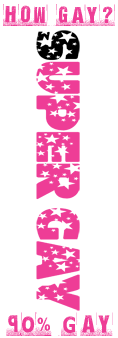

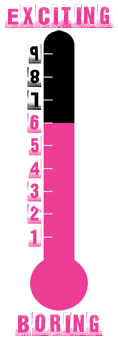
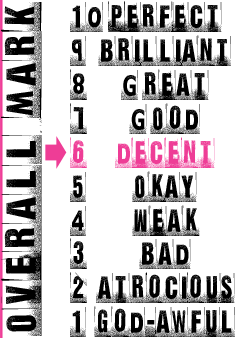
Leave a Reply (if comment does not appear immediately, it may have been held for moderation)